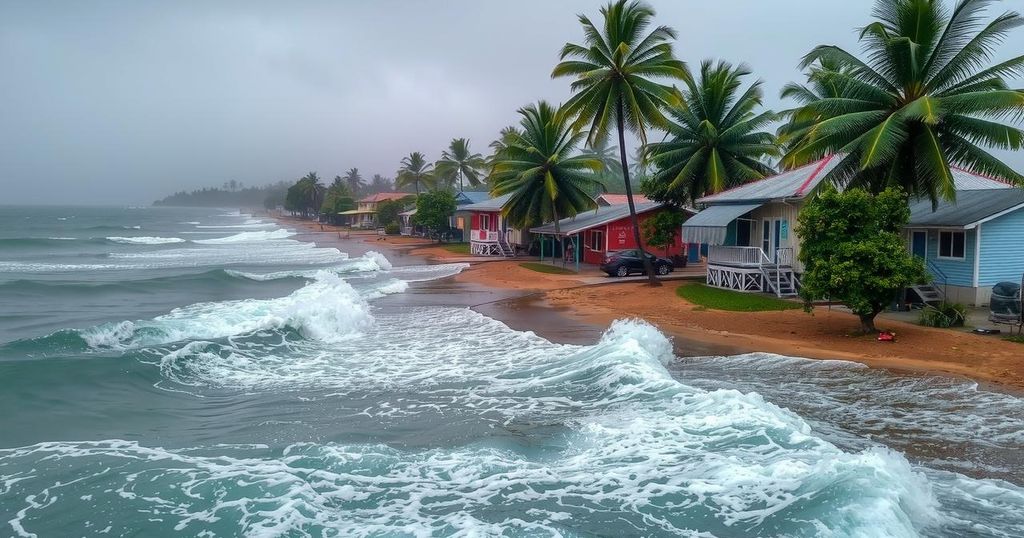Cyclone Chido: The Impact of Climate Change on Mayotte and Its Implications
Cyclone Chido, having recently struck Mayotte, has resulted in significant casualties and destruction, illustrating the devastating impact of climate change on natural disasters. Authorities are working to mitigate hunger, disease, and instability while acknowledging the cyclone’s intensified severity linked to climate warming, which highlights the vulnerability of underprivileged communities. The political ramifications in France concerning disaster response strategies are also under scrutiny.
Authorities are currently focused on preventing hunger, disease, and lawlessness from escalating in Mayotte, following the devastating impact of Cyclone Chido on December 14. This cyclone, the deadliest to affect the French overseas territory in over nine decades, brought winds exceeding 200 kilometers per hour, leading to widespread destruction, power outages, and disruption of communication. The official death toll stands at 22, with injuries exceeding 1,400; however, the actual fatalities may number in the hundreds or thousands, particularly among undocumented migrants.
According to the French weather service Meteo France, Cyclone Chido intensified to Category 4 status, creating unprecedented havoc in Mayotte. A report from Imperial College London indicates that climate change has been a significant factor in the increased intensity of Chido, raising its wind speeds and the likelihood of such storms. Dr. Nathan Sparks, a research associate at the college, confirmed that anthropogenic climate change contributed to an increase of approximately 11 kilometers per hour in wind speeds when the cyclone struck, rendering such extreme weather events 40 percent more frequent compared to pre-industrial levels.
Moreover, Dr. Friederike Otto from World Weather Attribution emphasized the direct correlation between poverty and climate change, highlighting how those with fewer resources become disproportionately affected by such disasters. She noted that the exacerbation of cyclones due to climate changes serves as a harsh reality for continents like Africa, which are among the least responsible for emissions yet face severe consequences.
As the French government mobilizes responses to the crisis, President Emmanuel Macron plans a visit to Mayotte, amidst growing criticism of governmental preparedness. Recently appointed Prime Minister François Bayrou has faced backlash for his remote participation in crisis assessments rather than addressing the situation in person. While Bayrou defended the response efforts, left-wing politicians argue that the government’s neglect of the overseas territory in the face of climate change has significantly contributed to the current disaster.
Despite the evident climate risks faced by overseas territories, European nations have historically failed to implement effective protective measures. A study by Réseau Action Climat highlighted their vulnerability, predicting that certain regions may become uninhabitable due to rising sea levels this century, exemplifying the urgent need for action and preparation in the face of climate change.
Cyclone Chido has raised critical discussions on the intersection of climate change and extreme weather events. This cyclone, categorized as the deadliest in Mayotte in the last 90 years, illustrates the significant impact of climate change on storm intensification. Reports indicate that human-induced climate change is altering the climate dynamics, leading to more intense tropical cyclones. Furthermore, the socio-economic vulnerabilities of populations such as undocumented immigrants in Mayotte address the broader implications of climate impacts on marginalized groups. The political context in France also highlights the governmental responses to natural disasters exacerbated by climate change, indicating systemic issues in preparedness and vulnerability assessment.
In summary, Cyclone Chido underscores the severe implications of climate change on intense weather events, exemplifying how such phenomena disproportionately affect vulnerable populations. The government’s response to the disaster serves not only as a crisis management issue but also exposes political tensions regarding disaster readiness and climate change awareness. Furthermore, Mayotte’s situation illustrates the urgent need for European countries to prioritize risk mitigation strategies to safeguard their overseas territories from the impacts of climate change moving forward.
Original Source: www.euronews.com




Post Comment